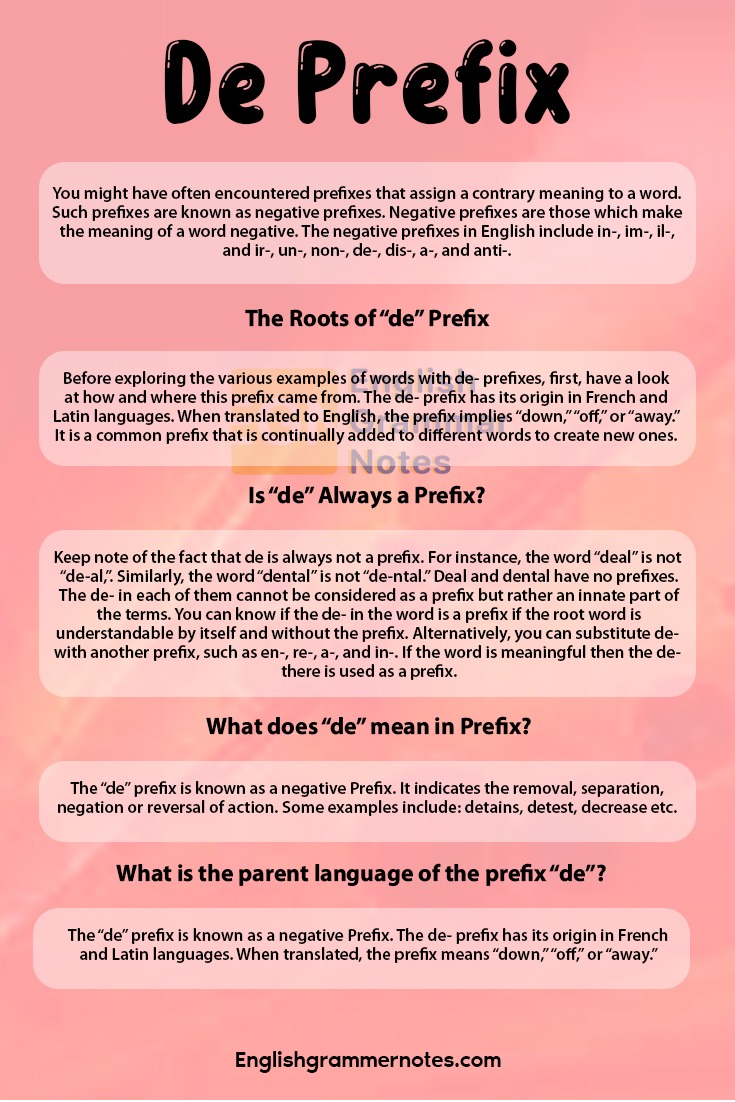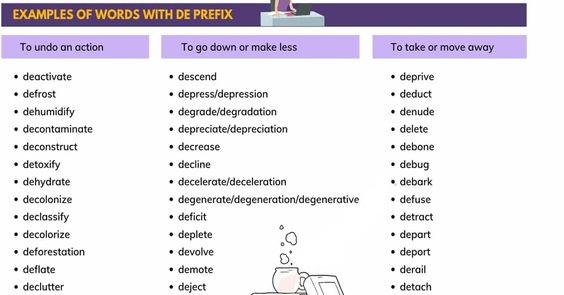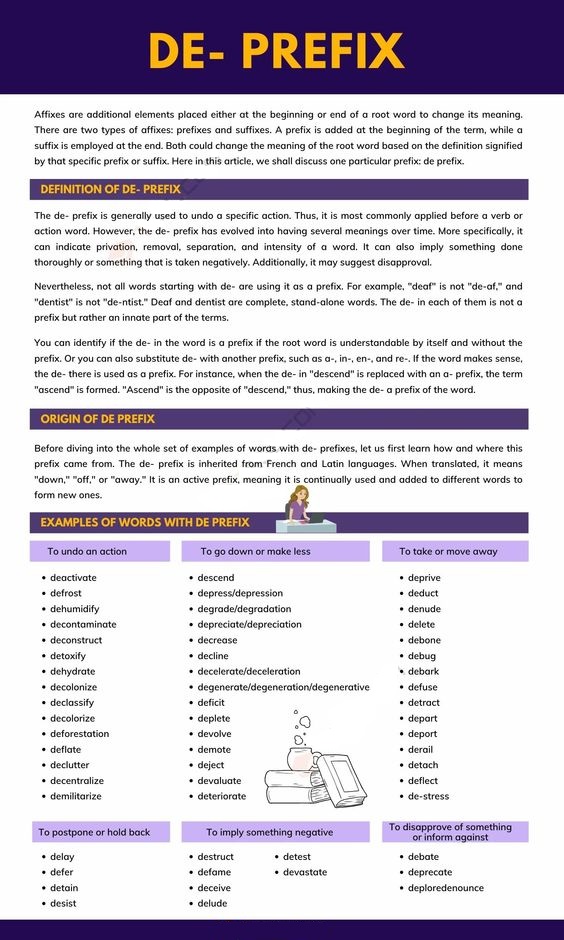You might have often encountered prefixes that assign a contrary meaning to a word. Such prefixes are known as negative prefixes. Negative prefixes are those which make the meaning of a word negative. The negative prefixes in English include in-, im-, il-, and ir-, un-, non-, de-, dis-, a-, and anti-.
The de- prefix is one of the commonly used negative prefixes in English. It is mostly placed before a verb or action word and signifies the meaning of “undoing an action”. However, today the prefix ” de” has grown to signify several meanings. More specifically, it refers to “undoing an action” by removal or separation. It can also refer to something done thoroughly or something that is taken negatively. Additionally, the prefix “de” also suggests disapproval.
- The Roots of “de” Prefix
- Examples of “de” Prefix
- Is “de” Always a Prefix?
- What does “de” mean in Prefix?
- What is the parent language of the prefix “de”?
- Is “de” a prefix or suffix?
- Does the prefix “de” mean to disapprove of an action?
The Roots of “de” Prefix
Before exploring the various examples of words with de- prefixes, first, have a look at how and where this prefix came from. The de- prefix has its origin in French and Latin languages. When translated to English, the prefix implies “down,” “off,” or “away.” It is a common prefix that is continually added to different words to create new ones.
Examples of “de” Prefix
As mentioned previously the prefix “de” can be used to signify various meanings. Given below is a list of meanings of “de” along with examples for each.
Meaning: undoing an action
- declassify
- decolorize
- decontaminate
- deforestation
- deflate
- declutter
- deconstruct
- detoxify
- dehydrate
- deactivate
- defrost
- dehumidify
- decentralize
- demilitarize
- decolonize
Meaning: To go down or make less
- demote
- deject
- depreciate
- deficit
- deplete
- devolve
- decrease
- decline
- decelerate
- degenerate
- devaluate
- descend
- depress
- degrade
- deteriorate
Meaning: to take away or move away
- detach
- deflect
- detract
- depart
- debug
- debark
- defuse
- deport
- deprive
- deduct
- denude
- delete
- debone
- derail
- de-stress
Meaning: to postpone something or hold back
- detain
- desist
- delay
- defer
Meaning: to indicate something negative
- devastate
- deceive
- delude
- detest
- destruct
- defame
Meaning: to disapprove of or inform against an action
- deplore
- denounce
- deprecate
- debate
Read More:
Is “de” Always a Prefix?
Keep note of the fact that de is always not a prefix. For instance, the word “deal” is not “de-al,”. Similarly, the word “dental” is not “de-ntal.” Deal and dental have no prefixes. The de- in each of them cannot be considered as a prefix but rather an innate part of the terms.
You can know if the de- in the word is a prefix if the root word is understandable by itself and without the prefix. Alternatively, you can substitute de- with another prefix, such as en-, re-, a-, and in-. If the word is meaningful then the de- there is used as a prefix.
For Example, take the word “descend”. To check if de is used as a prefix, replace it with an a- prefix. The word “ascend” is formed. “Ascend” has the opposite meaning of “descend”. Hence de- becomes the prefix of the word.

FAQs on “de” Prefix
1. What does “de” mean in Prefix?
The “de” prefix is known as a negative Prefix. It indicates the removal, separation, negation or reversal of action. Some examples include: detains, detest, decrease etc.
2. What is the parent language of the prefix “de”?
The “de” prefix is known as a negative Prefix. The de- prefix has its origin in French and Latin languages. When translated, the prefix means “down,” “off,” or “away.”
3. Is “de” a prefix or suffix?
“De” is a negative prefix that is commonly used in English. It appears in hundreds of vocabulary words. Some examples include: descent, deplore, detain etc
4. Does the prefix “de” mean to disapprove of an action?
Yes, The prefix “de” is a negative prefix that indicates disapproval. Examples of words that imply disapproval include: deplore, debate, denounce etc.
Conclusion
Knowledge of negative prefixes can help you easily change a word’s meaning to its opposite. The prefix “de” is one of the commonly used negative prefixes which is mostly placed before a verb or a word formed from that verb. It reverses the verb’s action, as in words like dehydrate, deactivate, or detoxify. However you must keep in mind that the prefix “de” can have other meanings as in, it means ‘down’ in descent, decrease, and depression.


